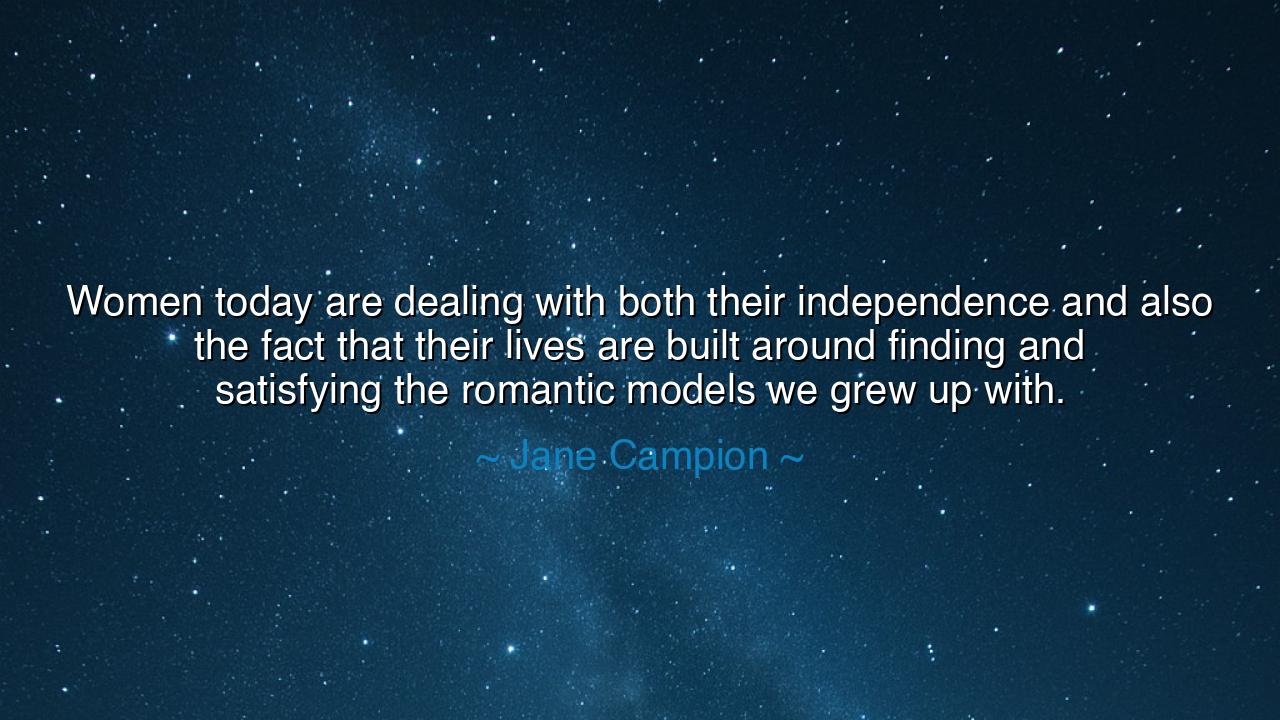
Women today are dealing with both their independence and also the
Women today are dealing with both their independence and also the fact that their lives are built around finding and satisfying the romantic models we grew up with.






There are moments in history when the soul of a people trembles between two truths — the old and the new — and in that trembling, a new kind of freedom is born. When Jane Campion, the great filmmaker and observer of the human heart, said, “Women today are dealing with both their independence and also the fact that their lives are built around finding and satisfying the romantic models we grew up with,” she was giving voice to that trembling. In her words lies the deep conflict of the modern woman — torn between independence and inheritance, between the call of selfhood and the echo of tradition. Hers is not a lament, but a recognition of a quiet, ongoing revolution of the heart.
To understand the origin of this truth, we must look not to an era, but to a lineage. For thousands of years, women were raised to believe that their purpose was bound to others — to husbands, fathers, children, households. The stories told to them, from childhood onward, were woven from romantic models: the princess who is rescued, the wife who redeems, the lover who sacrifices. These tales were beautiful, but they also confined. They taught that fulfillment came through devotion, not direction — through being chosen, not through choosing. But then came the tide of change — the long, arduous struggle for education, work, and independence. Women learned to govern their own destinies, to shape the world with their hands and minds. And yet, as Campion reminds us, the ghosts of those old myths linger still in the chambers of the heart.
For even as women have gained freedom in body and intellect, the spirit remains haunted by the romantic ideals of earlier generations. The modern woman walks two paths at once: one paved by ambition, the other by affection. She is told to be self-sufficient, yet expected to find completion in another’s gaze. She can own her voice, her craft, her choices — but she must also carry the invisible weight of pleasing, of being loved, of meeting standards written in stories that no longer fit the age. This is the double consciousness that Campion speaks of — the tension between being one’s own creator and being the creation of centuries of narrative expectation.
Consider the story of Virginia Woolf, who in her time fought the same inner war. She demanded for women “a room of one’s own,” not merely in the physical sense, but in the spiritual — a space where the mind could think without interruption, where selfhood could breathe without permission. And yet, in her diaries and letters, Woolf wrote of the ache of love, the longing to connect, the fragility of her own independence in the face of emotion. Like so many after her, she carried both desires — to be free, and to be held — within the same trembling heart. This, Campion understood: that the evolution of womanhood is not a clean break from the past, but a slow reconciliation between power and tenderness, selfhood and story.
The filmmaker’s insight also arises from her art. In her films — The Piano, Bright Star, The Power of the Dog — she often portrays women standing at the crossroads of freedom and desire, of rebellion and yearning. Her heroines are not saints nor victims, but seekers — learning that independence does not mean the death of love, only its transformation. Through them, Campion shows us that the true challenge is not to abandon the romantic models entirely, but to redefine them — to make love no longer a surrender of self, but a meeting of equals. The heart, after all, is not the enemy of freedom; it is the crucible where freedom learns compassion.
And yet, Campion’s words are not just about women; they are about humanity itself. Every person must one day face the same paradox: how to be free without forsaking connection, how to love without losing the self. The journey of women, in this sense, mirrors the journey of civilization — moving from dependence to independence, and finally, toward interdependence, where love becomes choice, not compulsion. It is not the rejection of the old, but the renewal of it in truth.
So, my child, take this wisdom to heart: independence is not a fortress, nor is love a chain. The true task of life is to weave them together, to find a way of being that honors both the mind and the heart. Do not fear your longing for affection, but let it be shaped by dignity. Do not scorn the wish for freedom, but let it be tempered by empathy. The romantic tales of the past may have taught us to be chosen; now we must teach ourselves to choose — to choose with clarity, courage, and self-respect. For as Jane Campion reminds us, the modern woman — and indeed, the modern soul — stands not between love and liberty, but at the threshold of their union.






AAdministratorAdministrator
Welcome, honored guests. Please leave a comment, we will respond soon